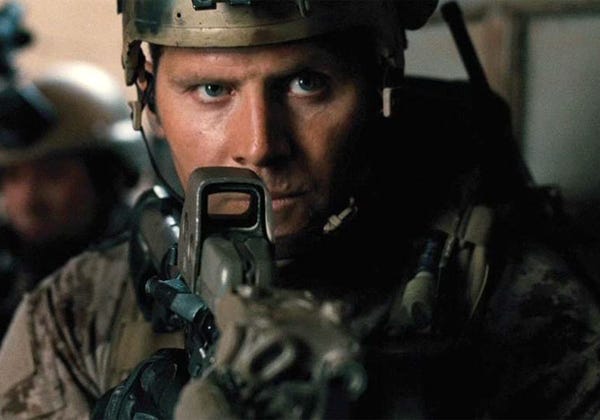Act of Valor

“Act of Valor” asks for trouble in the way few films do these days. That’s “trouble” with a capital “T,” which rhymes with “P” and that stands for “propaganda.” When you consider only the circumstances about "Act of Valor" and not the cinematic results, it’s an easy assumption to make.
Here is a film that’s a blurry hybrid of fact and fiction, starring actual active-duty U.S. Navy SEALs and a few marginally recognizable character actors. It’s a 180-degree turn from the public's general perception of these elite American military operators. For them, a concealed identity is possibly the most powerful weapon in their toolkit. It's fortuitously timed for interest in what SEALs do, hot on the heels of a SEAL team's killing of Osama bin Laden.
And despite two credited directors, “Act of Valor” was sanctioned and selectively edited by the Navy, which retained final cut privileges under the proviso of maintaining national security and protecting SEAL tactics.
Did the Navy have its own promotional and protective interests at heart as it shepherded “Act of Valor” along? Undeniably. But is the resultant film really propaganda? That weighty, loaded word is nothing but a semantic sand trap — literally defined by intent to influence attitudes and beliefs and broadly defined however we, as individuals, choose to color it with our own convictions.
At the end of “Act of Valor,” I did not feel manipulated by mawkish patriotism. I did not feel the impulse to clap. I did not believe Navy SEALs live only to kill people halfway around the world. I certainly didn’t think any armchair commando weaned on “Call of Duty” would leave the theater to camp overnight outside a Naval recruitment center — convinced that they could, in real life, do what they just saw.
Instead, I felt as if I’d watched another word that begins with “P” — a procedural. A frequently engrossing, recurrently flawed procedural about a certain type of work. Would a straight documentary a la "Restrepo" carry less of an agenda? Maybe. Would the use of recognizable actors have created the more comfortable detachment of entertainment? Well, that's why Bruce Willis and Dwayne Johnson are superstars.
You may feel differently, but that "Act of Valor" can leave us both with the possibility of differing interpretations is, to me, refreshing — given the straight-up spoon-fed prescription of patriotism it could have easily become.
Cobbled together from actual SEAL missions, the narrative follows a SEAL team as it tracks Shabal (Jason Cottle), a Chechen terrorist. Introduced detonating a courtyard of Filipino schoolchildren as collateral damage in the assassination of an American diplomat, Shabal launches a plan to smuggle state-of-the-art dirty bombs into the United States via Mexico.
His collaborator is Christo (Alex Veadov), a childhood friend who has diverged from Shabal’s ideological insistence to pursue a more carefree career as a smuggler. At first, screenwriter Kurt Johnstad (“300”) takes pains to illustrate Shabal as more than a cartoonish ethnic villain hijacked from a mid-1980s Cannon film — evil but with complexities. But as the SEALs get hotter on his tail, Shabal becomes little more than a superficial super-villainous cipher.
The team’s pursuit takes them to Costa Rican jungles, African deserts, yachts in the middle of the ocean and drug dens in Mexico. Action breaks out at nearly every location and the film maintains a swift, enveloping momentum. But “Act of Valor” is a far cry from a film like “Kick-Ass,” in which oohing and aahing at stylish, nearly fetishistic gunplay is the point.
There are plentiful eruptions of gunfire here, but they rarely feel jerry-rigged for rah-rah excitement — preceded by lots of patrolling and positioning that have become as instinctive to the SEALs as tasks at an office job are for others.
Only one moment — a deus ex machina mow-down of a convoy of bad guys from soldiers who aren’t SEALs — feels like a regrettable bid for a hell-yeah fist pump. And Shane Hurlbut's cinematography flirts with video-game gratuitousness in occasional flashes to first-person perspectives of a helmet cam.
The performances clang loudly, but that’s expected. (An introduction from co-directors Mike McCoy and Scott Waugh feels like a preemptive apology for the acting, or lack thereof, you’re about to see.) Save for the Senior Chief — whose job it is to gather intelligence and thereby slip in and out of character moments — these men lack charisma to carry any scene in which dialogue is more than perfunctory. In the film’s best scene, the Senior Chief interrogates a target so snappily, you’ll be convinced he’s a trained actor.
Working hard to compensate, the script refers to these men in omnipresent voiceover as “chambers of loss, triumph, hurt and love.” On one hand, you miss the presence of trained actors to really show what we’re being told. On the other, “chamber” seems an appropriate word choice for men who must, by their nature, compartmentalize and close off. A momentary daydream about pending divorce or debts could jeopardize the team. SEALs wouldn’t talk about such topics on a mission, so why would they dwell on it in a film rooted in the slightest dramatization possible?
Greatness and awfulness are usually easy extremes for film critics; we can simply assess whether something falls at or between those marks. For something like “Act of Valor,” those extremes aren’t terribly helpful. A more applicable question to consider is this: Does the film let us decide how we feel about the methods it depicts, or does it insist upon with-us-or-against-us patriotism?
“Act of Valor” has problems. But I appreciate its instinct to simply present its audience with an immersive depiction of what a Navy SEAL’s work might be like … and respect it enough to let all of us arrive at our own conclusions.


